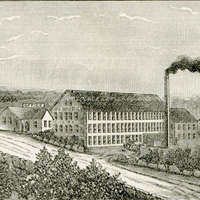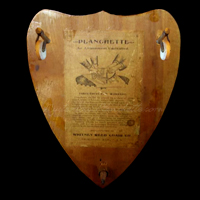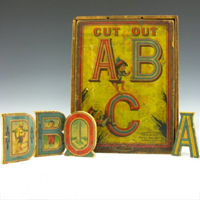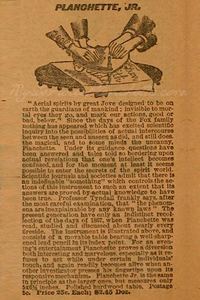The W.S. Reed Toy Company and the Whitney Reed Chair Company are intrinsically linked by both location and product, and just as the companies themselves did in 1899, we've merged their company profiles into one listing. Both companies were founded in Leominster, Massachusetts in the late 19th century. W.S. Reed was the first to exist, founded in 1875, and primarily manufactured wooden toys such as ships, circus mobiles, and even a few board games. Whitney Reed Chair Company, on the other hand, was founded in 1893, and manufactured high-quality furniture, though it also produced rocking horses and wooden toys such as alphabet blocks. Whitney Reed Chair Company would eventually absorb the remnants of the W.S. Reed Toy Company in 1899 after disaster struck the W.S. Reed factory. Until the merger, however, the historical relationship between the two and the planchettes they produced is somewhat difficult to unravel.
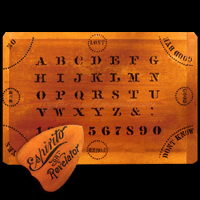
W.S. Reed Toy Company's "Espirito" talking board. Note matching planchette shape. 1892
Credit: Photo courtesy williamfuld.com.
Several years before the merger, the talking board craze hit, and in 1891, W.S. Reed capitalized on their popularity to produce his now-rare "Espirito" line of talking boards. This same year, Chicago's Fair department store also advertised Reed writing planchettes for sale at .30 cents each, describing them as giving "written answer to questions. Tells your fortune better than a clairvoyant. A source of endless amusement and entertainment." Evidence suggests that this W.S. Reed product persisted until at least 1899, and that both a 6 1/2-inch long and 7 3/4-inch long version existed. These devices proved to have better longevity than Reed's Espirito talking boards, as their trademark for a "toy resembling a planchette" failed to protect that product, and it is possible a threat of litigation from the Ouija Novelty Company drove their talking board line out of production after only a few months. At the time, Reed put forth a notice to the trade directing all sales to Fuld's company, and ceased production of talking boards immediately, though their writing planchette line continued. But these assumptions raise many questions, with new evidence supporting the manufacture of a "witch board" by W.S. Reed years before the craze, as shown by a newspaper article describing the company sending one such board to President Grover Cleveland. Research into these clues and what they mean for our talking board timeline is still ongoing.
Though retired from talking board sales, W.S. Reed continued producing planchettes, and may have even converted old stock of their rather large talking board planks into automatic writers, or used the same tempalte all along, as their dimensions seem a close match. The subsequent planchettes offered by the Whitney Chair Company rose from the ashes of the W.S. Reed's talking board abandonment both figuratively and literally. After several years of planchette sales, W.S. Reed suffered a catastrophe on February 7, 1896 when a fire ripped through their factory that destroyed 3 of their 4 buildings and much of the company's inventory. This disaster was too much for William Reed, and the company's founders bought stock in the neighboring Whitney Chair Company, who also purchased the toy company's remaining assets. The two officially merged in 1899.
Before the merger, there is no listing for Whitney planchettes in the company's catalogs, though several exist post-merger in other catalogs, such as the John Zernitz Company's 1901-1902 printing. Until a fateful discovery in the collection of the Washington County Historical Society of West Bend, Wisconsin, we had no clear confirmation of which company brand these planchettes might have been. We only had an original listing to intrigue us, that stated simply: "To supply the continued demand for planchettes we are making a fine polished board, heart shaped, seven inches long. Has brass casters with fine hardwood wheels, and a substantial pencil holder and pencil. Each one packed in a nice paper box, with full directions for operating."
Between this listing, and the discovery of a Whitney-branded planchette in the archives of the Washington County Historical Society, we finally confirmed that Whitney Reed produced planchettes in the years after the merger! The plank is a real beauty, despite a sloppy varnish job, with the same fine hardwood as you would expect from a furniture company. It has a nicely illustrated label, and we hold out hope for the rediscovery of an original box, which is no doubt nicely lithographed in line with the other Whitney Reed products of the era. The castors on the model shown are not original, but are of the right type and have been digitally added to give a complete picture of the board. The pencil sleeve is of wood, and very similar to Boston Planchette apertures. These sorts of discoveries are just what keep our Curator busy!







